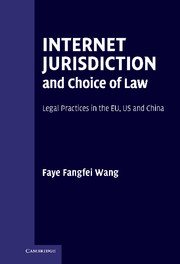Book contents
- Frontmatter
- Contents
- Preface
- List of Abbreviations
- Table of Cases
- PART I Introduction
- PART II Jurisdiction
- PART III Choice of law
- PART IV Online dispute resolution
- 10 Alternative dispute resolution and the Internet
- 11 The legal obstacles and solutions to online arbitration and online mediation
- PART V The future
- Appendix 1 Council Regulation (EC) No 44/2001 of 22 December 2000 on jurisdiction and the recognition and enforcement of judgments in civil and commercial matters (Brussels I)
- Appendix 2 Regulation (EC) No 593/2008 of the European Parliament and of the Council of 17 June 2008 on the law applicable to contractual obligations (Rome I)
- Bibliography
- Index
11 - The legal obstacles and solutions to online arbitration and online mediation
from PART IV - Online dispute resolution
Published online by Cambridge University Press: 03 May 2011
- Frontmatter
- Contents
- Preface
- List of Abbreviations
- Table of Cases
- PART I Introduction
- PART II Jurisdiction
- PART III Choice of law
- PART IV Online dispute resolution
- 10 Alternative dispute resolution and the Internet
- 11 The legal obstacles and solutions to online arbitration and online mediation
- PART V The future
- Appendix 1 Council Regulation (EC) No 44/2001 of 22 December 2000 on jurisdiction and the recognition and enforcement of judgments in civil and commercial matters (Brussels I)
- Appendix 2 Regulation (EC) No 593/2008 of the European Parliament and of the Council of 17 June 2008 on the law applicable to contractual obligations (Rome I)
- Bibliography
- Index
Summary
Online dispute resolution (ODR) brings efficiency and convenience to the resolution of conflicts but at the same time it faces a number of challenges due to technology, management and legal obstacles. This chapter will focus on the legal obstacles to the facilitation of online arbitration and mediation, discuss the modernisation of the current legislation in the field of private international law and alternative dispute resolution and evaluate the necessity for harmonisation of international standards of ODR services and implementation of the proposed solutions through the reform of the existing international, regional and national laws or by supplementing it with new subject-specific legislation.
Legal obstacles to ODR
ODR is certainly much younger than most of the existing laws. Whether the existing laws can provide a sufficient legal basis for cases resolved through ODR is very controversial. Whether new laws should consider the inclusion of provisions tailored for the new information technology is also debatable. However, the bottom line is that ODR has become a reality due to its increasing use. The interpretation of the rules determining the validity of electronic arbitration and mediation agreements and the enforcement of electronic arbitral awards and settlement agreements differs in different countries. In order to encourage and enable ODR to proceed, legal obstacles must be removed.
Online arbitration
Online arbitration is one of the most complicated ODR processes as its non-localisation challenges the traditional concepts of “the arbitration agreements”, “the place of arbitration” and “the place of arbitral awards”.
- Type
- Chapter
- Information
- Internet Jurisdiction and Choice of LawLegal Practices in the EU, US and China, pp. 156 - 176Publisher: Cambridge University PressPrint publication year: 2010



